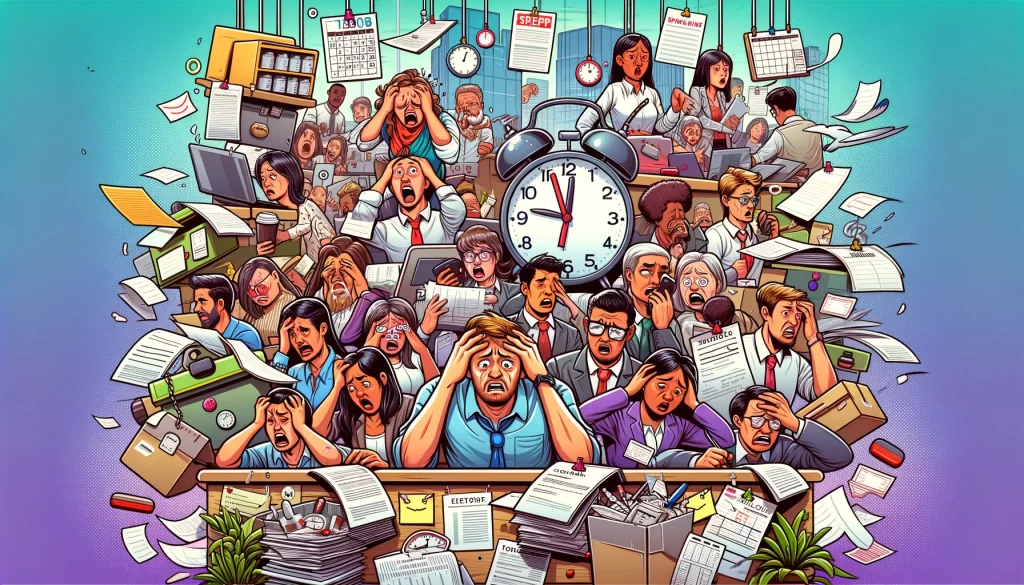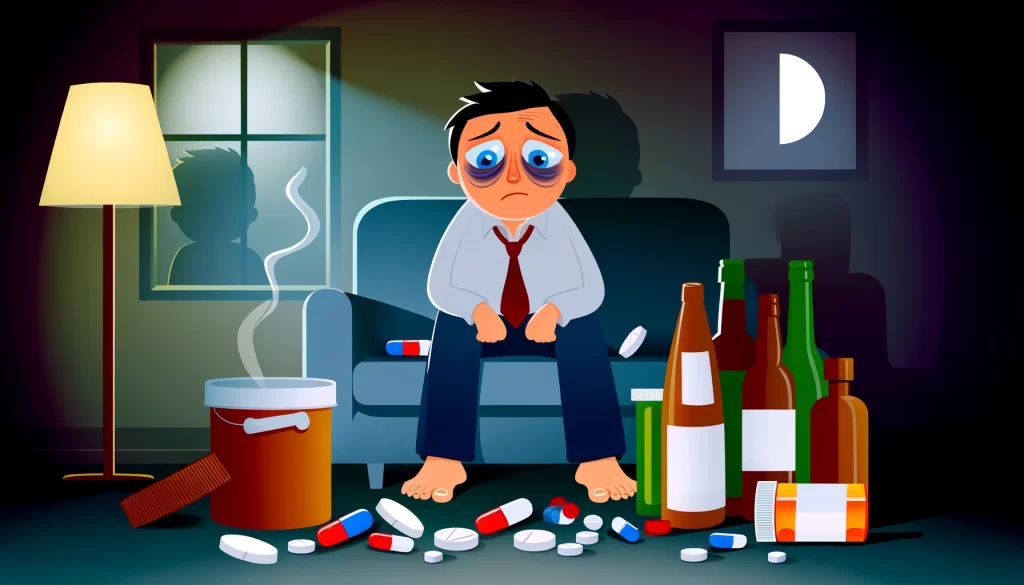Last Updated on February 17, 2024 by Daniel Boyce
Feeling overwhelmed by work stress?
You’re not alone.
Our deep dive into the effects of job-induced stress reveals the critical need for balance and self-care.
From understanding the physical and mental tolls to recognizing warning signs and finding actionable solutions, we explore how to navigate these challenges.

Discover the importance of managing stress, the pivotal role of sleep and exercise, and when it might be time for a career reassessment.
Plus, learn about the invaluable support and resources available to help you regain control and ensure your job supports, not hinders, your well-being.
Ready to make a change?
Let’s embark on this journey together towards a healthier work-life balance.
Key Takeaways:
- Recognize job stress’s physical and mental tolls, including chronic conditions and emotional well-being.
- Be aware of stress indicators such as substance use and sleep pattern changes.
- Implement strategies for a balanced work-life, emphasizing sleep and exercise.
- Evaluate career decisions for health and happiness, and don’t hesitate to seek support when overwhelmed.
Recognizing the Warning Signs of a Stressful Work Environment
It’s crucial to notice when work stress begins to affect our health.
Warning signs indicating a stressful work environment:
- Constantly feeling overwhelmed or anxious
- Frequent headaches or physical complaints
- Decreased job satisfaction and morale
- Increased workplace conflicts or tension among colleagues
- Difficulty concentrating or making decisions
- Changes in sleep patterns or habits
- Reliance on substances like caffeine, alcohol, or drugs to cope with work stress
Substance Use as a Coping Mechanism
One particular sign that we wanted to highlight that can be especially harmful, is using drugs or alcohol to cope with a stressful work environment.
Turning to alcohol or drugs after a long day at work might seem like a quick fix to unwind, but it’s a red flag signaling deeper issues.

This reliance can be a sign that the stress from your job is becoming unmanageable, affecting not just your physical health with potential for addiction and disease, but also your mental well-being, straining your ability to cope in healthy ways.
Addressing these habits is critical in breaking the cycle of stress and finding more sustainable ways to handle work pressures.
Understanding the Impact of Job Stress
This section delves into the serious implications of job stress, exploring how the pressures of work can manifest physically and mentally.
We’ll uncover the signs that indicate your job may be more than just a source of income but a potential threat to your health and well-being.
Physical and mental symptoms of work stress:
| Physical Symptoms of Work Stress | Mental Symptoms of Work Stress |
|---|---|
| Frequent headaches | Anxiety |
| Muscle tension or pain | Irritability or anger |
| Stomach issues | Depression |
| Fatigue | Feeling overwhelmed |
| Changes in appetite | Problems with concentration |
| Trouble sleeping | Lack of motivation or focus |
This table illustrates the diverse impact that work stress can have on both the body and mind, underlining the importance of recognizing these symptoms early to manage and mitigate their effects effectively.
The Physical Toll of Work Stress
Physical signs of work stress are hard to ignore.
Stress can impact your physical health, emotions, and behavior.
Recognizing stress symptoms is crucial for management, as unchecked stress can lead to serious conditions like heart disease, stroke, and diabetes.
The Mental Toll of Work Stress
Mental symptoms of work stress can subtly infiltrate your life, manifesting as anxiety, irritability, or even depression.
Stress can take a toll on your mental well-being, resulting in various symptoms including irritability, aggression, a sense of helplessness, sleep issues, fatigue, sadness, and difficulties with concentration or memory, among other signs.
Acknowledging these signs is the first step towards seeking relief and restoring equilibrium.
The Consequences of Ignoring Job-Induced Stress
Ignoring job-induced stress can have significant repercussions on our health and overall quality of life.
Let’s delve into how prolonged stress from work can manifest in physical and mental health challenges, and why it’s crucial to address these issues head-on.
Long-Term Health Risks
When we say “my job is killing me,” it’s not just a figure of speech.
Continuous job stress can lead to serious long-term health risks, including heart disease, high blood pressure, and chronic stress.
These conditions not only diminish our quality of life but can also shorten it.
Employees facing constant work stress might notice an increase in health issues, emphasizing the need for effective stress management strategies to safeguard their health.
The Silent Killer: Stress and Its Effects
Stress is often called a silent killer for a reason.
It can creep up unnoticed, manifesting through symptoms like sleep disturbances, chronic pain, and mental health struggles such as anxiety and depression.
The relationship between stress and physical health is well-documented, showing how stress can exacerbate or lead to conditions like heart disease and high blood pressure.
Recognizing the impact of stress on our emotional and physical well-being is the first step towards mitigating its effects and improving our work-life balance.

Striking a Healthy Work-Life Balance
Finding harmony between our professional and personal lives is crucial for our overall well-being.
This section explores how to effectively manage work stress and the significant roles that sleep and exercise play in maintaining this balance, ensuring we’re not just surviving but thriving in all aspects of our lives.
Practical Tips for Managing Work Stress
Navigating work stress is crucial for both our wellbeing and career enjoyment. Here’s how:
- Set firm boundaries between work and personal time.
- Prioritize tasks by urgency and importance.
- Delegate tasks when you can.
- Take short breaks to refresh your mind.
- Don’t shy away from seeking support from peers or professionals.
Embracing these strategies not only reduces stress but also boosts your overall job satisfaction. By managing work pressures proactively, you create a more balanced and productive work environment for yourself.
The Role of Sleep and Exercise in Stress Management
Sleep and exercise are powerful tools in combating work-related stress.
Adequate sleep rejuvenates the body and mind, improving concentration and mood, which are often compromised by stress.
Establish a regular sleep routine and create a restful environment to enhance sleep quality.
Exercise, on the other hand, releases endorphins that naturally boost your mood and reduce stress levels.
Incorporating regular physical activity into your routine, whether it’s a brisk walk or a workout session, can significantly improve your physical and emotional health, helping you to manage work stress more effectively.
When It’s Time for a Change
Sometimes, the stress from work becomes a wake-up call signaling it’s time to reassess our career paths.
This section dives into how to evaluate your current job situation and decide whether staying or moving on is the best course for your health and happiness.
Evaluating Your Career Choices
Taking a step back to evaluate your career choices is crucial when feeling overwhelmed by job stress.
Consider factors like the impact on your mental health, the presence of chronic stress, and whether your job aligns with your long-term career goals.
Reflect on what changes could improve your situation—be it seeking opportunities for advancement, requesting more meaningful work, or even considering a complete career shift.
Understanding what you value in your work can guide you toward a more fulfilling career path.
Making the Decision to Stay or Leave
Deciding whether to stay in your current job or leave for a new opportunity is a significant choice that impacts your overall well-being.
Weigh the pros and cons, considering how your job affects your health issues, emotional health, and work-life balance.
If efforts to reduce job stress have been unsuccessful and your health is suffering, it may be time to explore new careers or places that prioritize employee well-being.
Remember, leaving a stressful job situation can sometimes be the most empowering step towards a healthier, happier life.
Seeking Support and Resources
Feeling overwhelmed by work stress is a common experience, yet it’s important to remember that support is available.
Support Resources for Work-Related Stress:
- Mental Health Professionals: Counselors or therapists can guide you through stress management techniques and coping strategies.
- Online Forums and Mental Health Apps: Platforms where you can share experiences and find advice.
- Social Media Support Groups: Communities offering empathy and understanding from those in similar situations.
- Local Support Groups and Workshops: Face-to-face opportunities to learn stress management skills.
Utilize these resources by reaching out for professional guidance when symptoms like sleep disruption or emotional distress become unmanageable.
Engaging with online and community support can also provide practical advice and a sense of belonging, helping you navigate through challenging times with confidence.
Remember, taking the step to seek help is a sign of strength and the first step toward reclaiming your well-being.

Conclusion
We’ve navigated through the multifaceted ways job stress can impact our lives, from health risks to affecting our sleep and mental well-being.
Recognizing warning signs and seeking balance are crucial steps toward safeguarding our health.
Whether contemplating a career shift or finding strategies to manage stress, remember you’re not alone.
Support and resources are available to guide you toward a healthier work-life dynamic.
Let this be a call to action: assess your work stress and take the necessary steps to prioritize your health.
Remember, a fulfilling career shouldn’t cost your well-being.

Daniel Boyce, founder of AwareRecruiter.com, brings a diverse background in health, fitness, sales, and recruitment to career development. He’s passionate about helping professionals overcome workplace challenges and succeed in new roles. Daniel’s vision for AwareRecruiter.com is to create a comprehensive resource for career growth and satisfaction.